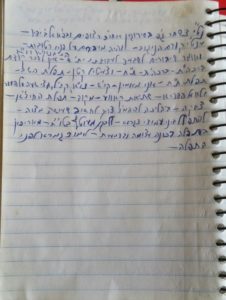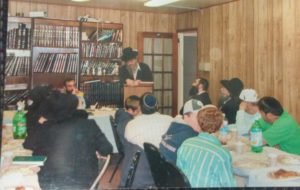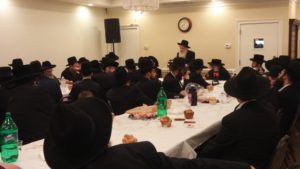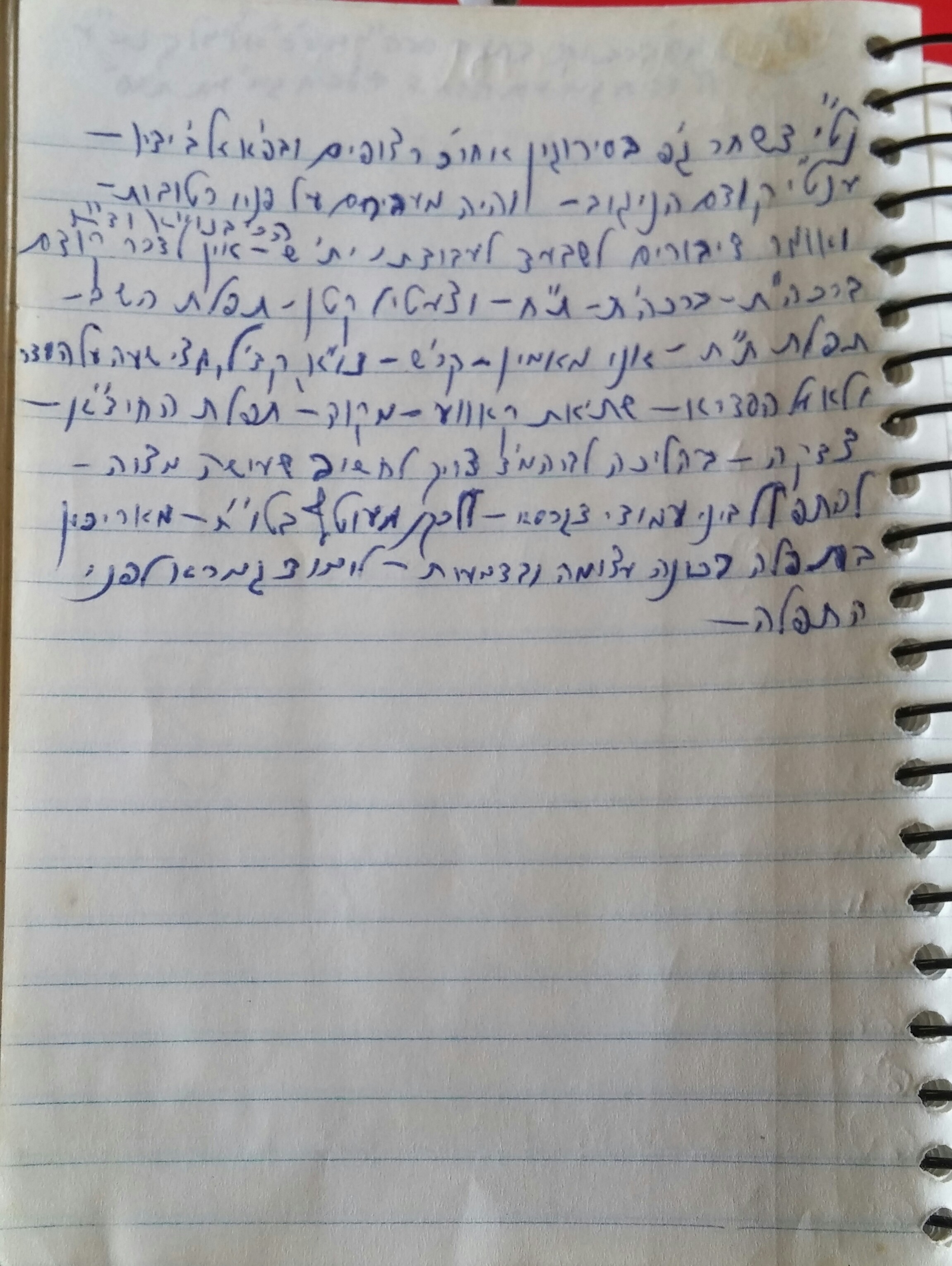 It seems like it happened yesterday; the bitter tidings that Tatte was niftar after being hit by a car. It was so sudden and unexpected. Life has certainly changed for all of us. To me, for instance, davening b’tzibbur three times a day is no longer something I strive to do, but rather something I make certain to implement to the best of my abilities.
It seems like it happened yesterday; the bitter tidings that Tatte was niftar after being hit by a car. It was so sudden and unexpected. Life has certainly changed for all of us. To me, for instance, davening b’tzibbur three times a day is no longer something I strive to do, but rather something I make certain to implement to the best of my abilities.
My new “vocation” as a shliach tzibbur comes with its own challenges. I have been variously told that I daven beautifully, too slow, too fast and everything in between. At the commencing of one Minchah, a young man approached me and commented that I slow down just a tad. At that point I thought to myself “masai yagiu maasai l’maasaei avosai.” How far are my ways from the ways of my father. I recall at the shivah a person remarking that if there was one grudge that anyone could hold against my father, it would be that his davening took too long. My father was an old fashioned “davener”. Every word was weighed and enunciated with painstaking precision as the seforim say one should utter every word as if one were counting coins. Sometimes this would cause him problems as not exactly everyone appreciated it.
Sometimes he was on the receiving end of ridicule from someone who had had enough and was urging him to and finish up already. My father stopped davening for the omud when he realized that the respective minyan that he started with was not the same as the minyan that remained with him when he got to Borchu, and yet a new crop stood behind him as he was about to start the Amidah. By the time he got around to Kaddish he had to go and look for people to be mashlim the minyan. This was discouraging to him and he made a remark to the effect of “dos is nisht kein minyan” (this isn’t a [real] minyan). He truly could not understand why anyone would bother showing up to shul just to go through the motions. For him, davening was an avodah that required prior preparations and real kavannah.
My father was born in 1950 in Yerushalayim, a world certainly different than my own. His next-door neighbor was the Brisker Rov zt”l. He glimpsed the lives of various rebbes and gedolim up close. In Eretz Yisroel he gave sholom to Rav Aharon of Belz zt”l and saw his father interacting with Rav Zelig Reuven Bengis zt”l and many others from that time and place. As a young man in America he attended the tishen of the Satmar Rebbe zt”l and the Skulener Rebbe zt”l. At the same time he studied Torah at the feet of Rav Abba Berman zt”l and Rav Moshe Eisemann zt”l among others.
 My father was an unusual combination of a warm chossid and an individual who was completely absorbed in a world of Torah and halacha. One of his unseen projects was the establishment of a yeshiva to be called Bais Moshe Chaim. In addition to the allusion to his father-in-law, R’ Moshe Chaim Engel z”l, the yeshiva was to combine the scholarship and chassidus of the Divrei Chaim of Sanz with the unique derech of the Chasam Sofer.
My father was an unusual combination of a warm chossid and an individual who was completely absorbed in a world of Torah and halacha. One of his unseen projects was the establishment of a yeshiva to be called Bais Moshe Chaim. In addition to the allusion to his father-in-law, R’ Moshe Chaim Engel z”l, the yeshiva was to combine the scholarship and chassidus of the Divrei Chaim of Sanz with the unique derech of the Chasam Sofer.
Tatte sometimes worked as a mashgiach kashrus. Employers did not always like him, because he would not budge from what he felt was proper halacha. When he sometimes felt that the kashrus standards were not up to par, he would not hesitate to bring the issue to management. He would often remark that “people eat at this establishment because they see me and they rely on me. Therefore, I can not and will not compromise, even if it’ll cost me my job”. Indeed, an individual told me about the time when he went to the restaurant for the first time and felt very uneasy about eating there until he saw he glimpsed into the kitchen and saw a distinguished man engrossed in his hashgacha work, at which point he felt greatly relieved.
What also comes to mind is the time he was involved with the kollel in Manalapan, NJ and his kiruv work among unaffiliated Jews in that area. He loved introducing unaffiliated Jews to Yiddishkeit and he often would sit and learn with them with limitless patience.
His limmud haTorah was exceptional. On Shabbos afternoons, he would be seen in shul shortly after concluding the Shabbos meal, engrossed in learning until Minchah. Many got to know him from the daily chavrusahshaft that he maintained, for the better part of the last decade, with R’ Eliyahu Rothkopf at Kol Shimshon in Lakewood. This pair could not be more different, one a Yerushalaymer chossid and the other a retired professor and talmid chochom. Many visitors to the shul would smile when observing the two going at it in learning. One saw in them the literal implementation of what chazal explicate on the verse in parshas chukas: “v’es vohev besufo”. Talmidei chachachim become “enemies” of each other (in learning), but they do not budge from one another until there is a mutual love between them in the end. The sometimes loud arguing between them was gazed upon fondly by the young and old who come to the shul to daven and learn. He was a true role model for the young bochurim who were duly impressed by his hasmada and his amazing charifus and bekius. He succeeded in implanting in many a renewed appreciation for limmud b’iyun.
 Tatte was also sensitive and considerate. During the shivah, a young bochur came over and proclaimed that he took upon himself certain kabbolos in Tatte’s memory. In answer to my query how he knew the man, he replied that he didn’t know him but rather saw him every morning in shul and was gratified that this distinguished-looking talmid chochom would take the time every day to warmly greet him with a “Good morning.”
Tatte was also sensitive and considerate. During the shivah, a young bochur came over and proclaimed that he took upon himself certain kabbolos in Tatte’s memory. In answer to my query how he knew the man, he replied that he didn’t know him but rather saw him every morning in shul and was gratified that this distinguished-looking talmid chochom would take the time every day to warmly greet him with a “Good morning.”
Tatte had a tremendous sense of appreciation (hakarat hatov). He was a diabetic and had problems with his feet. Nonetheless, He would often trudge through the snow for long distances to attend an affair of a friend on Shabbos. One person related how he and his wife had organized a lavish meal to commemorate the anniversary of his fathers’ passing. However, nobody showed up because of severe weather conditions. They were feeling dejected and dispirited until they heard a knock on the door. Who was standing there but Abba. They were overjoyed as he greeted them with warmth, stayed and spoke to them words of encouragement for several hours.
A friend of Tatte related another anecdote that additionally brings out his consideration for others. At one point, he had joined a kollel erev. The Kollel commenced every evening at a certain time but people would sometimes arrive 5 or 10 minutes later. Tatte would not hear of it. When a fellow member once gave him a ride and they arrived several minutes late, he was displeased, remarking to the effect that “it’s someone’s money, how can I be even one minute late?”.
He absorbed all of this and more from his parents and grandparents. He would pride himself to his children on the choshuve roots of the mishpacho. His father’s mother was a direct descendant of Rav Yona Frankel Teumim zt”l, author of Kikayon D’Yonah. Another ancestor, of which he spoke about beamingly, was the famed Rav Yaakov Fisch of Kaliv zt”l. Torah, avodah and gemilus chassodim were in his veins, and it shone brightly through to all who knew him.
He truly personified the meaning of his name, Meir. He was also me’ir ponim to many needy and elderly folk. In this my father was outstanding. He would seek out the elderly and abandoned and learn with them and be mechazeik them. Their happiness brought him joy. These elderly and abandoned souls formed a strong bond with him, as they sometimes would find it hard to believe that such a talmid chochom was gladly volunteering his precious time to be with them. At the shloshim for his brother-in-law Reb Mordechai Engel z”l, just three months ago, my father related how one of his elderly chavrusas once inquired of him, “Are you coming back tomorrow as well?”. My father was a giver. He was not a person of material means but of great spritual ones, and he shared those goods gladly and with a generous hand. Tatte also often hosted meshulachim and others at his home, providing them with a comfortable room while Mamme would cook them hot meals several times a day.
I remember years ago when we were still living in Brooklyn, Mamme would sometimes daven at the nearby Satmar Shul on 10th Ave. On one occasion, she returned home from davening and related to Tatte how she met in shul an elderly widow, Rebbetzin Feige Shuster, in shul. When my father heard this, he was ecstatic and exclaimed “I knew her illustrious husband! I remember running after him in Torah Vodaas.” Rav Shlomo Shuster zt”l was indeed a person to run after. Born in Lithuania, he was among the last of a disappearing crop of Torah giants who knew Shas by heart. He was nicknamed “The Sokolker Iluy” for his hometown in Lithuania and for his genius mind. My father was determined to do something for the memory of the husband of his newfound neighbor, since he did not leave any progeny. He formed an organization called Zichron Shlomo which raised money for poor talmidei chachamim in Eretz Yisrael. In addition, my father, with the assistance of Rav Mordechai Tzvi Susna z”l, organized a lavish melava malka every year to honor his memory and to continue his legacy. This tradition was kept up for many years while she was alive. Many, who had never heard of Rav Shuster got a glimpse of some of his greatness and were greatly inspired. The melava malka would be well attended. Roshei yeshivos such as Rav Shmuel Berenbaum zt”l, Rav Asher Katzman zt”l and others would attend yearly and speak.
All of this brought great joy to Rebbetzin Shuster a”h. I remember as a child this tzadeikes, physically diminutive in stature but a giant in spritual gifts, standing by the mechitzah, her face all aglow, showering us with blessings. One particular blessing stands out. She vinched un my parents for all their children to be zocheh to marry the offspring of rabbonim and roshei yeshivos. Needless to say that berocho came true.
With all of my father’s many qualities, he was quiet and unassuming. His sudden tragic demise has shaken us all to the core. He left us not one ethical will but many-in both words and deeds. I have had the opportunity to rifle through of his writings and I found them filled with personal notations regarding undertaking fasts, studying all manners of holy writ- and most importantly increasing the love for fellow Jews. My father was the epitome of an individual who acutely felt the pain of the forlorn; the elderly and the disadvantaged of our society.
Abba, you are missed dearly by many who knew you and by many who are only getting to know you now. May your neshama reach the heights of heaven and may we learn to emulate all of your good deeds
Yehi zichro boruch.


Thank you for a beautiful write up.
Beautiful words of chizuk !! The neshomo should have a lichtiga gan Eden.
In regards to davening for the amud , I know exactly how u feel being in the same situation davening for my father ztl a few years ago.
Just keep in mind u will get plenty of comments , complaints and compliments. But the ultimate zchus for ur father is to just never argue or get angry in any way even if someone took the amud from u saying he was there first etc.
Bsuros tovos